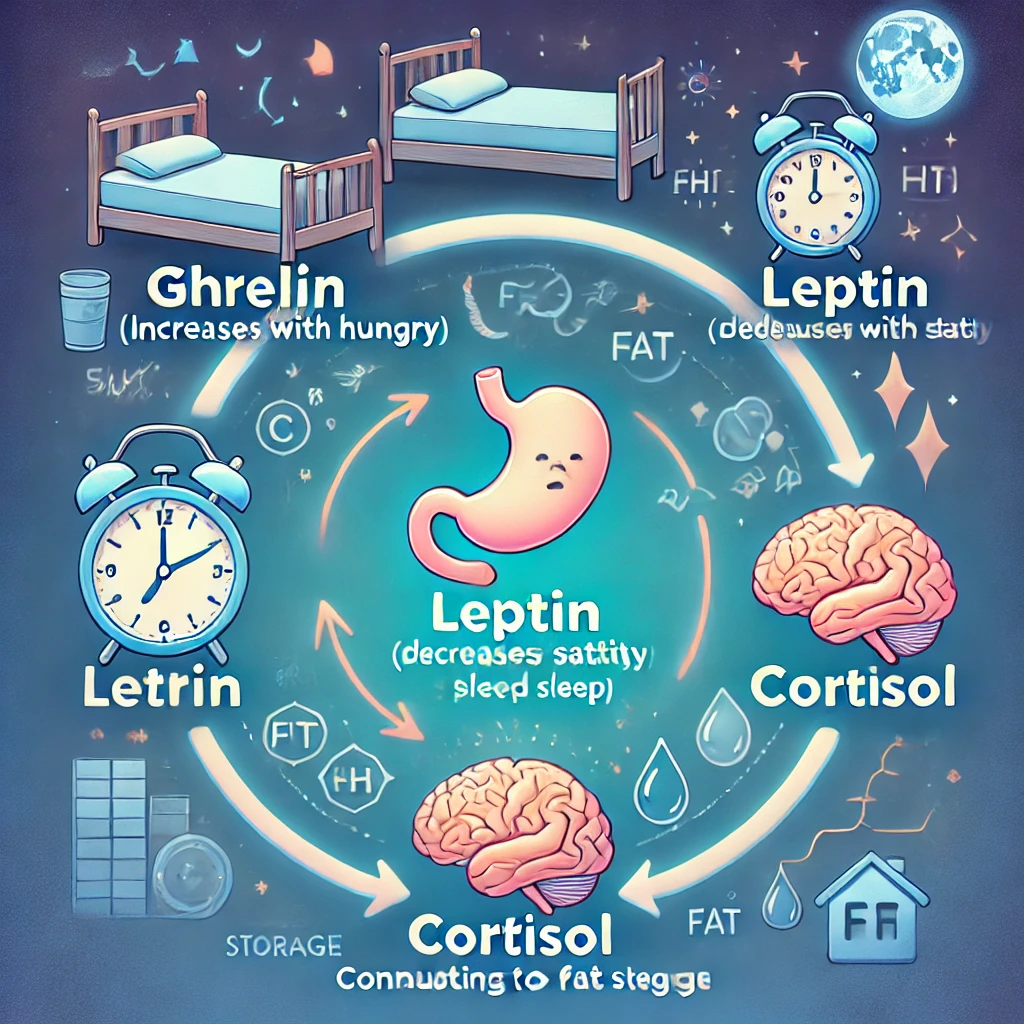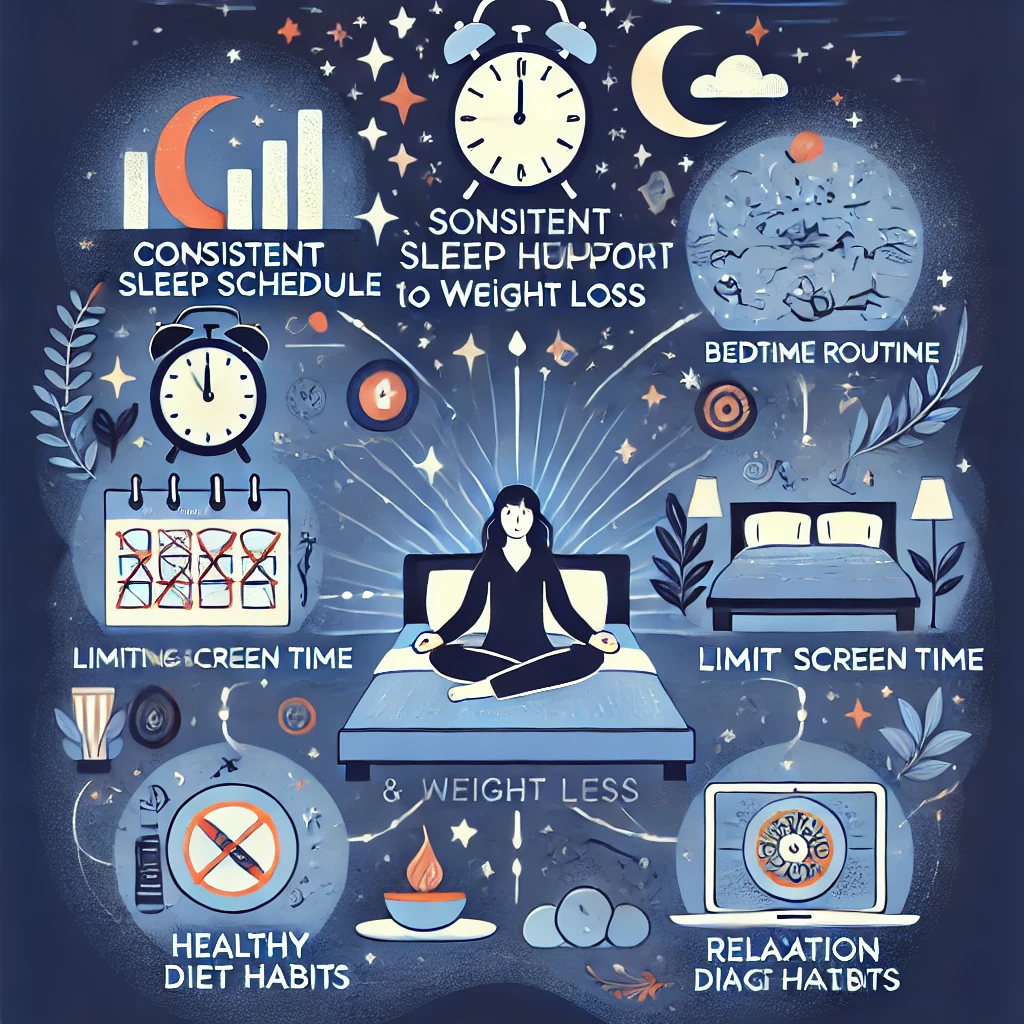How Better Rest Helps Better Style
How Sleep Affects Your Weight Loss Efforts
Sleep plays a crucial role in weight loss by influencing hunger hormones, metabolism, and overall energy balance. When you’re sleep-deprived, the body produces more ghrelin (the hunger hormone) and less leptin (the fullness hormone), increasing appetite and cravings, especially for high-calorie foods. Sleep deprivation also raises cortisol levels, which can lead to emotional eating and fat storage, particularly in the abdominal area.
Metabolism slows down without sufficient sleep, leading to fewer calories burned at rest. Poor sleep also decreases insulin sensitivity, making it harder to regulate blood sugar and increasing fat storage. Additionally, lack of sleep impairs decision-making and impulse control, making it harder to resist unhealthy food choices.
Quality sleep is vital for muscle recovery and repair, which is essential for metabolism-boosting muscle growth. Furthermore, sleep affects physical performance and energy levels, meaning you’re less likely to engage in exercise when tired.
Aiming for 7-9 hours of quality sleep per night can improve your body’s response to food, boost metabolism, and support your weight loss efforts. Establishing a regular sleep routine and creating a sleep-friendly environment can make a big difference in achieving and maintaining a healthy weight.
The Science Behind Sleep and Metabolism
Why Rest is Important for Fat Burning
Sleep is essential for maintaining a healthy metabolism, directly impacting the body’s ability to burn fat. When you sleep, the body undergoes hormonal balancing that regulates hunger and energy use. Two hormones—leptin, which signals fullness, and ghrelin, which stimulates hunger—are affected by sleep quality. Lack of rest reduces leptin and raises ghrelin levels, increasing appetite and cravings for calorie-dense foods.
Sleep also supports insulin sensitivity. When sleep-deprived, the body struggles to use insulin effectively, leading to higher blood sugar levels and increased fat storage. Additionally, sleep impacts cortisol levels, the stress hormone, which, when elevated, can encourage the storage of fat, particularly around the abdomen.
Finally, quality sleep is crucial for muscle repair and recovery, supporting lean muscle growth that helps increase calorie-burning even at rest. Thus, consistent, quality sleep is essential for efficient fat metabolism and sustainable weight management

The Role of Hormones: Ghrelin, Leptin, and Cortisol
Hormones like ghrelin, leptin, and cortisol play a major role in regulating hunger, energy balance, and fat storage, all of which impact weight management.
Ghrelin, often called the “hunger hormone,” is produced in the stomach and signals to the brain when it’s time to eat. Ghrelin levels typically rise before meals and decrease afterward. However, lack of sleep disrupts this cycle, leading to elevated ghrelin levels that can increase appetite and cravings, especially for high-calorie foods.
Leptin, on the other hand, is produced by fat cells and signals satiety, helping to curb hunger and regulate energy balance. When you’re sleep-deprived, leptin levels decrease, making it harder to feel full and leading to overeating. Together, higher ghrelin and lower leptin levels drive the urge to consume more calories, particularly unhealthy foods, hindering weight management.
Cortisol is a stress hormone released by the adrenal glands that rises with physical or emotional stress. Elevated cortisol from chronic stress or lack of sleep can trigger fat storage, particularly in the abdominal area, as the body goes into energy conservation mode. This combination of increased appetite, reduced satiety, and fat storage caused by disrupted ghrelin, leptin, and cortisol levels highlights the importance of sleep and stress management for effective weight regulation.
How Ghrelin Increases Hunger When You’re Tired
Leptin’s Role in Feeling Full Cortisol and Belly Fat: The Stress-Sleep Connection
When you’re tired, hormones like ghrelin, leptin, and cortisol can significantly impact hunger and fat storage.
How Ghrelin Increases Hunger When You’re Tired
Ghrelin, known as the “hunger hormone,” increases when you’re sleep-deprived. This hormone sends signals to your brain that increase appetite, making you more likely to crave calorie-dense foods. Inadequate sleep raises ghrelin levels, leading to overeating and an increased desire for sugary or fatty foods, which can hinder weight management.
Leptin’s Role in Feeling Full
Leptin is the hormone that helps regulate energy balance by signaling fullness to the brain. When you’re well-rested, leptin levels are balanced, helping you feel satisfied after meals. However, lack of sleep reduces leptin, impairing your brain’s ability to recognize fullness. This imbalance between ghrelin and leptin can lead to overeating and weight gain over time.
Cortisol and Belly Fat: The Stress-Sleep Connection
Cortisol, the body’s primary stress hormone, also affects weight. Poor sleep elevates cortisol levels, which can lead to increased abdominal fat storage. High cortisol levels make your body more likely to hold onto fat, especially in the belly area, where it’s metabolically active. This sleep-stress connection not only raises cortisol but also triggers more cravings, linking poor sleep with weight gain and increased stress.
Why Lack of Sleep Leads to Cravings and Overeating
Lack of sleep can lead to intense cravings and overeating due to disruptions in hormone levels, brain function, and energy needs. When you’re sleep-deprived, the body’s hunger hormones become imbalanced: ghrelin levels rise, increasing hunger, while leptin levels drop, making it harder to feel full. This hormonal shift triggers a stronger desire to eat, especially for calorie-dense, sugary, and high-fat foods that provide quick energy.
Sleep deprivation also affects the brain’s reward center, heightening cravings for “comfort” foods. Studies show that sleep-deprived individuals experience greater activation in brain areas related to pleasure and reward, leading to a stronger response to junk food and making it harder to resist unhealthy options.
Additionally, lack of sleep raises cortisol levels, which can increase stress-induced eating. High cortisol, combined with low energy from fatigue, pushes the body to seek easily accessible calories, making it more likely to overeat. This cycle can lead to unwanted weight gain over time, highlighting the importance of prioritizing sleep for better appetite control and balanced food choices.
How Sleep Deprivation Affects Decision-Making Around Food
Emotional Eating When You’re Exhausted
Sleep deprivation significantly impairs decision-making around food, making it harder to resist unhealthy options. When you’re tired, the prefrontal cortex—responsible for rational thinking and self-control—functions less effectively, weakening your ability to make balanced food choices. Meanwhile, areas of the brain linked to reward, like the amygdala, become more active, intensifying cravings for high-calorie, sugary, and fatty foods. This imbalance often leads to impulsive eating.
Exhaustion also increases the likelihood of emotional eating. When you’re fatigued, stress hormones like cortisol stay elevated, creating a desire for “comfort” foods that provide a quick mood boost. These foods release dopamine, the brain’s “feel-good” chemical, offering brief relief from stress. However, this effect is short-lived, and the cycle of emotional eating can lead to overeating and weight gain. Prioritizing adequate sleep supports better self-control, improved mood, and healthier eating habits, making it easier to maintain a balanced diet.
Mindful Eating for Weight Loss: How to Control Cravings and Avoid Overeating

How Much Sleep You Need for Optimal Weight Loss
Getting enough sleep is crucial for optimal weight loss, as it significantly impacts hormones, metabolism, and lifestyle choices. Most adults need between 7 to 9 hours of quality sleep each night to support overall health, including weight management. When sleep is insufficient, levels of the hunger hormone ghrelin increase, while levels of leptin, the hormone that signals fullness, decrease. This imbalance can lead to increased cravings and overeating, making it harder to stick to a healthy diet.
Additionally, lack of sleep affects metabolism, slowing down the body’s ability to burn calories effectively. Sleep-deprived individuals may also feel less motivated to exercise, impacting calorie expenditure. Research has shown that people who sleep less than 7 hours per night may struggle more with weight loss compared to those who get sufficient rest.
Quality sleep also promotes better mood and decision-making, making it easier to resist unhealthy foods and stay consistent with dietary and exercise routines. To optimize weight loss, focus on establishing a consistent sleep schedule, creating a restful sleep environment, and avoiding stimulants like caffeine before bed. Prioritizing sleep is a simple yet powerful strategy to enhance weight loss efforts and support long-term health.
Recommended Hours of Sleep for Adults
Signs You’re Not Getting Enough Quality Sleep
Adults typically need 7 to 9 hours of sleep each night for optimal health, although individual needs can vary slightly. Consistently getting within this range supports cognitive function, mood regulation, immune health, and metabolic processes. However, many adults fall short of this amount due to busy schedules, stress, or sleep disorders, which can negatively impact overall well-being.
Signs of insufficient sleep include chronic fatigue, irritability, and difficulty concentrating. You may also notice physical symptoms like frequent headaches, weakened immunity (resulting in frequent colds or infections), and weight gain. Sleep deprivation affects hormone levels, including an increase in cortisol (the stress hormone), which can make it harder to relax, creating a vicious cycle of poor sleep quality. Poor sleep also disrupts the balance of hunger-regulating hormones like ghrelin and leptin, leading to increased appetite and cravings for high-calorie foods.
Waking up feeling unrested, experiencing frequent mood swings, and relying on caffeine to get through the day are clear indicators of poor sleep quality. Establishing a regular bedtime, creating a calming pre-sleep routine, and limiting screen time in the evening can help improve sleep quality, allowing adults to achieve the recommended hours of restorative rest.

Tips for Improving Your Sleep to Boost Weight Loss
Improving your sleep can be a powerful tool for boosting weight loss, as quality sleep supports metabolism, hormone balance, and energy regulation. Here are some effective tips:
Maintain a Consistent Schedule: Go to bed and wake up at the same time every day, even on weekends. This helps regulate your body’s internal clock, making it easier to fall asleep and wake up naturally.
Create a Relaxing Bedtime Routine: Calm activities like reading or meditation can signal your body to wind down. Avoid screens, as blue light disrupts melatonin production, a hormone crucial for sleep.
Limit Caffeine and Alcohol: Caffeine can stay in your system for hours, impacting sleep. Alcohol may make you feel drowsy initially but can disrupt deep sleep cycles later in the night.
Optimize Your Sleep Environment: Keep your bedroom cool, quiet, and dark. A comfortable mattress and pillows also contribute significantly to restful sleep.
Watch Evening Eating Habits: Heavy meals late at night can disrupt digestion, while small snacks rich in tryptophan (like nuts) may aid in relaxation.
Prioritizing quality sleep supports healthy cortisol levels and balances hunger hormones, making it easier to stick to weight-loss goals by reducing late-night cravings and promoting better overall energy.
How to Maintain Weight Loss: Tips for Long-Term Success
Create a Sleep Routine for Better Rest
Foods and Drinks That Promote Better Sleep
Limiting Screen Time Before Bed
Create a Sleep Routine for Better Rest
Establishing a consistent sleep routine is key for quality rest. Aim to go to bed and wake up at the same time daily to set your body’s internal clock. Wind down 30–60 minutes before bed with calming activities like reading, gentle stretching, or meditation. This preps your mind and body for sleep, making it easier to drift off.
Foods and Drinks That Promote Better Sleep
Certain foods and drinks can help promote relaxation and improve sleep quality. Foods rich in magnesium (like leafy greens and nuts) and tryptophan (found in turkey and dairy) support sleep. Herbal teas such as chamomile or valerian root also encourage relaxation, helping you fall asleep faster. Avoid caffeine and sugary foods late in the day to prevent disruptions.
Limiting Screen Time Before Bed
Limiting screens before bed reduces exposure to blue light, which interferes with melatonin production. Try avoiding screens an hour before bed and, if needed, use “night mode” settings to reduce blue light. Replacing screen time with a book or journal can improve sleep readiness and relaxation.
How to Start Counting Calories for Weight Loss
